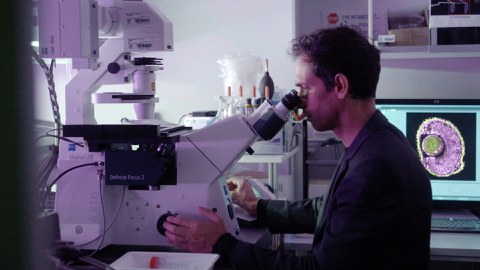Prof. Otger Campàs
© Camera: Avanga, post production: Janett Hanitzsch
Understanding life down to the smallest detail – this is the vision of the Cluster of Excellence Physics of Life (PoL). The Cluster focuses on the laws of physics that underlie the organization of life into molecules, cells and tissues. To this end, scientists from TU Dresden and the partners within the DRESDEN-concept research alliance are working together in the cluster. More specifically, 39 research groups from the Max Planck Institute of Molecular Cell Biology and Genetics (MPI-CBG), the Max Planck Institute for the Physics of Complex Systems (MPI-PKS), the Leibniz Institute of Polymer Research (IPF) and the Helmholtz-Zentrum Dresden-Rossendorf (HZDR) are involved in the cluster. The complex task of understanding the dynamic organization principles of the living state of matter is organized into six Research Avenues (RAs).
Prof. Otger Campàs, who was appointed to TU Dresden in 2021, holds the Chair of Tissue Dynamics and is speaker of PoL. He leads the research group “Physics of Embryonic Self-Organization and Morphogenesis”, an interdisciplinary team that bridges physics, biology and engineering to study how cells self-organize to build embryonic structures. The Campàs lab is hosted at the MPI-CBG. Otger Campàs‘ research is about understanding the collective interactions between cells and how these help build tissues and organs during embryonic development. He and his team have developed novel techniques that allow direct quantitative measurements of cell and tissue mechanics within in multicellular systems, including living embryos. The results from his research groups are changing the conceptual frameworks to understand fundamental physical aspects of living matter which, in the future, can help understand disease processes and potentially create new therapeutic opportunities.
Four questions for Prof. Otger Campàs
What is excellence for you?
Excellent is defined differently for different people. The most important point for me is that you need to be at the forefront of the field. You can do many types of research, but there are some big, open questions in the field, which are obviously more difficult to tackle. Excellence means that you are going after those questions and that you are leading the way in the field. In Dresden we are doing that perfectly. On a personal level I value a lot being very creative in research because at the end of the day is new wave ideas that make breakthroughs in the field. The key point is to make a very good environment to enable this creativity to emerge. That is something that not only depends on the people, you also need to actively generate that environment that makes the ideas pop up. This is what we are trying in the cluster of excellence.
What makes Dresden special?
Dresden is a very unique environment for biological physics and physics of living systems. Many years back, I started developing this new wave in the field of quantitative biology and physics of living systems. Then, that movement expanded to TUD and created an environment in Dresden, the DRESDEN-concept research alliance, which is very strong in biological physics to the point that it's like one of the strongest places in the world in this area. The cluster of excellence just brings it a step further. When we finish the cluster of excellence, it's going to be one of the top places for biological physics.
What are the benefits of being part of DRESDEN-concept?
The advantages in Dresden is that many scientists share similar interests. Everyone wants to work together, which is extraordinarily collaborative. DRESDEN-concept enables you to share resources among different institutions in Dresden and at TUD. It's a very fertile environment for research. I have to say that in terms of resources, I do research using microscopy, the genomic facilities, like all the things are absolutely spectacular, even world class.
How do researchers benefit from each other in Dresden?
Physics of life is a term that embraces everyone. You need physicists, theorists, experimentalists, biologists of different backgrounds, computer scientist, chemists and engineers to build the machines that we use. This new wave in science, we are going into is extraordinary interdisciplinary - you cannot do it alone. Therefore, it's so important to have structures that enable this collaboration. The cluster of excellence is perfect for this because we have a core group of scientists that are building it, and we have this network around of people from different disciplines that are all fitting in. We have the resources to collaborate with each other. That is the key: An environment that actively foster these interdisciplinary collaborations.


